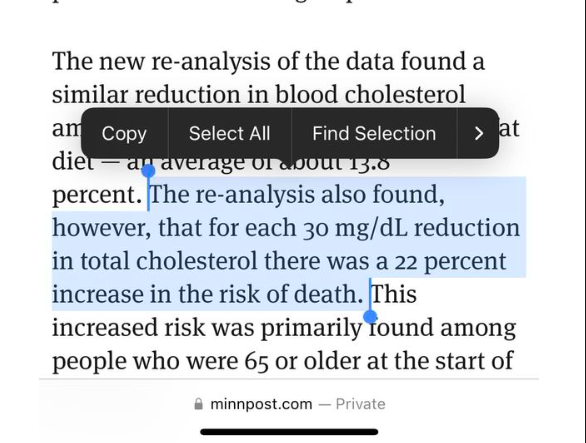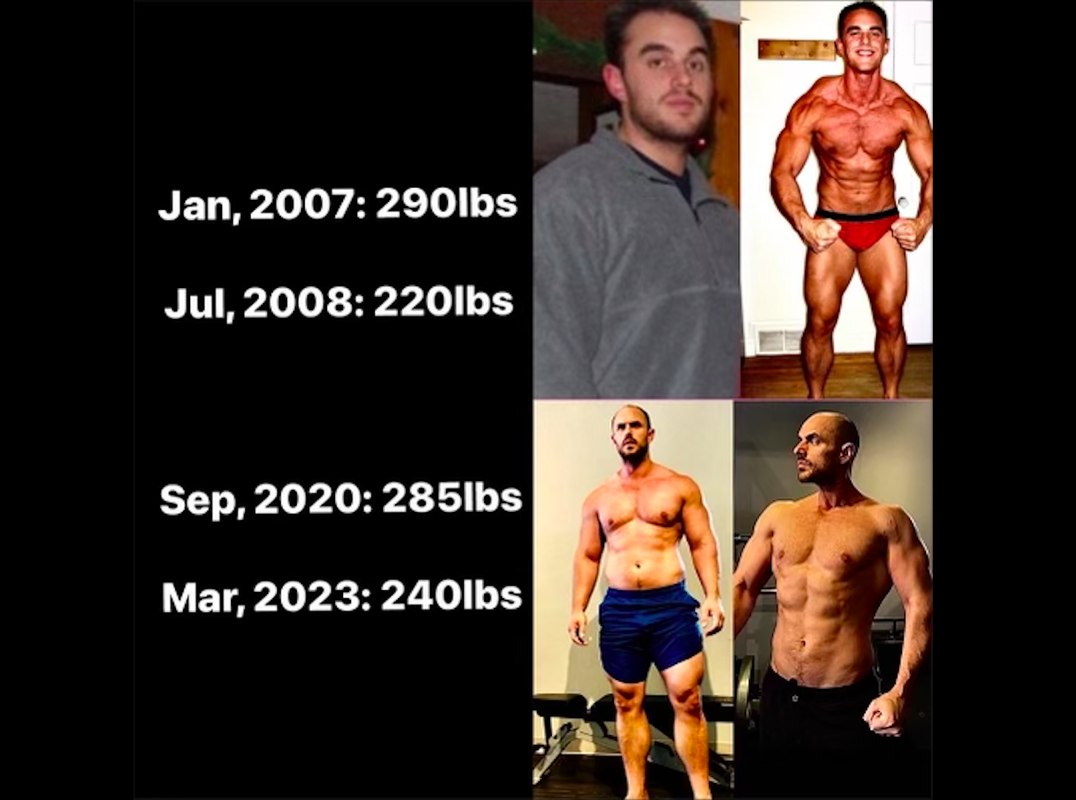|
People focus on reps. People focus on types of exercises. People will even talk a lot about form and technique. But the quality of the movement extends beyond all of these.
People will report reps to me as if anyone should care. What was the QUALITY of each rep? What was the range of motion? What was the time under tension? What was the degree to which you could connect with the intended muscles? Reps are A way to describe a performance. It is our jargon for moving a resistance down and up or up and down, from a start position through resistance to a certain distance and back to that start position. But someone can make an exercise easier and less effective BY PERFORMING MORE REPS, even with the exact same exercise with the exact same resistance, IF the range of motion is less, the activation of intended muscles is less, and the tempo is faster. Imagine someone squats with 100lbs on his back. He takes 5 seconds to descend into a full rock bottom squat (approximately 135 degrees knee flexion). He pauses for 3 seconds. He ascends over the course of 4 seconds. ONE REP. Full range. He can feel the hips and glute muscles working intently and intentionally. Quality. 12 seconds time under tension for a single rep. In a few months, imagine, he reports back 200lb back squats for 10 reps. Sounds good, right? But then we discover he doesn’t achieve more than 45 degrees knee flexion, and tempo is now .5/0/.5. Garbage quality. The entire set of 10 reps takes less time than the single rep used to. Time under tension is AT LEAST 2 seconds less than it was; and he never interfaces with the myofibril landscape to stimulate progress. He doesn’t feel his glutes working. He isn’t intentional with hips. He’s regressed, become weaker, and I can guarantee he can’t even manage 100lbs in the full squat anymore. This happens. I have observed it many times. People will speed up and shorten range and REDUCE engagement in order to create the impression that more was done. But it’s actually far less. People will attend group classes where a set of an exercise could be multiple minutes. They pause longer in low effort positions (knees locked or elbows locked). They shorten the amount of joint angle used. They REDUCE the overall work performed, all the while claiming they’ve done more. The human animal is an energy conservation machine. So it will literally do anything in order to exert less effort. This includes completing more reps or doing more of anything in order to APPEAR to be doing more, when, in fact, the effort and work performed is less. It is to satisfy the mind’s desired belief to be improving. I’ve seen the phenomenon with people in running or endurance programming. I’ve seen it with people in their own strength programs. I’ve fallen prey to it in my own lifts. In order to combat it, we need to periodically complete super slow reps. Especially power athletes, especially explosive athletes, especially people like me who are wired for more of the max strength tempos, we must from time to time train outrageously lengthy reps. For some clients, I’ve insisted they complete a 10 count on the descent and another on the ascent. Usually, we’ll pick a weight that’s 25-50% of what they’ve been doing. But it almost doesn’t matter at the beginning, because they soon discover there are all sorts of muscles and fibers and tissues and feedback they’ve perhaps never had before. We begin to strengthen sections of the movement they’ve always used momentum to avoid or shortened range of motion to avoid. And people will realize that they are being much more effective and working HARDER than ever before simply by implementing intentionality, slowing down, getting in touch with quality. You can integrate this into an existing program within the midst of a single set here and there. Or you can completely overhaul your full program by making every set like this. Simply grab a weigh or hop on a machine or set up for a body weight exercise; take the extra time and care to think about and feel which muscles or area of the body must be involved; and begin the movement, counting, “10, 9, 8, 7, 6, 5, 4, 3, 2, 1,” taking note the intended muscles are still intentional and the movement is quality, then begin to return to start position, “10, 9, 8, 7, 6, 5, 4, 3, 2, 1.” Don’t even both counting reps. This is more than enough mental bandwidth. It could be 2. It could be 5. But just keep the intention and the quality.
0 Comments
The cholesterol hypothesis (or "lipid hypothesis") never rose past the threshold of "theory," as it never made useful predictions, nor did it ever get vindicated in reproducibility (the standard of science). Yet a lot of people treat it like a scientific law. In 2010 the Journal of The American Medical Association exposed how the benefit of statins is questionable and that major trials on the subject were influenced by money tied to statin manufacturers: https://jamanetwork.com/journals/jamainternalmedicine/fullarticle/416101. Numerous randomized controls trials prior to 2004 suffered scandals and conflicts of interest which led to regulations in hopes of more reliable studies thereafter. However, of the 29 major randomized control trials on the topic since, 27 DID NOT affirm the expectations of the lipid hypothesis: https://amjmed.org/a-reappraisal-of-the-lipid-hypothesis/. When the mainstream authorities place more rigid protections on the reliability of studies and you reach a fail rate of 27 out of 29, what we're talking about is no longer science. It is anti-science. It is pseudoscience. But it is not science.
Now, the problem isn't simply that observational studies consistently fail at substantiating the notion that cholesterol is the boogeyman. The problem is that the hypothesis was always untenable. Cholesterol is what makes all of human biology possible. It heals you. It is the building material for every cell membrane in the body. IF WE REMOVED EVERY SCRAP OF FREE CHOLESTEROL FROM THE BLOOD YOU WOULD NOT MEANINGFULLY CHANGE THE AMOUNT OF CHOLESTEROL IN THE BODY. There are 100 trillion cells in the body, each one wrapped in cholesterol. When you begin to run the math on a 180lb person, 12lbs of whom is blood, you begin to get a sinking sensation that we’ve wasted a lot of ink on the wrong tissue. That 12lbs of blood is about 54 deciliters. If that person has a cholesterol of 200 (as in 200 milligrams per deciliter), we are talking 11 grams of cholesterol in the entire bloodstream. Meanwhile, the other 168lbs of that person is 76,363 grams. Since the cytoplasm makes up almost 70% of a cell, we’ll leave only 30% for the membrane (40% of which is cholesterol). That’s 9,000 grams of cholesterol outside of the blood. Literally, you could zero out your blood levels of cholesterol or triple them and it wouldn’t change the content in the body by even one-half of one percent. After all, we know that people in prolonged fasts have temporary rises in blood serum measurements of cholesterol. Where did all the extra cholesterol come from if they aren’t eating? Ancel Keys, the University of Minnesota researcher responsible for this 1940s lipid hypothesis belief system, had his heart in the right place and was even a relatively intelligent guy. But he NEVER showed how cholesterol INDEPENDENT OF INFLAMMATORY STRESS (or, more specifically in his work it was HIGH BLOOD PRESSURE AND SMOKING) would constitute a risk. No one else has either. Of course, they could not. Heart disease is the accumulation of plaques, by definition. And these plaques are caused by inflammation. In fact, researchers have shown that inflammation begins to generate heart disease "even in the absence of traditional risk factors": https://pubmed.ncbi.nlm.nih.gov/22895665/. It is paramount that you as the reader understand the prior quote. While the body has unhealthy persistent inflammation, LDL (the "bad" cholesterol) can be low or in "healthy" ranges, and heart disease will still occur. That means that LDL cannot be solely or predominantly responsible in the development of atherosclerosis. Moreover, there are undeniable facts and known biological science which makes the lipid hypothesis impossible: - There isn’t actually evidence that eating dietary cholesterol has any adverse risk response in the body: https://www.mdpi.com/2072-6643/10/6/780... - Most heart attacks occur in people with normal or low cholesterol: https://www.uclahealth.org/.../most-heart-attack-patients... - When people fast for a week (NO FOOD), their bodies actually produces MORE cholesterol for a period of time: https://pubmed.ncbi.nlm.nih.gov/7569738/ - Lowering “bad cholesterol” to improve health is not supported by data: https://www.bmj.com/.../doubt-cast-on-wisdom-of.../ - And eating low fat, avoiding saturated fat, and emphasizing seed oils actually appears to increase risk of death (even when cholesterol drops) or AT BEST has zero positive impact on risk: https://www.minnpost.com/.../new-look-old-u-m-study.../ Physicians and clinicians I've coached and mentored since 2004 are mostly not up-to-date on their own publications altogether, particularly on this front. Anything involving nutrition science is just a minefield for them. However, I have noticed that it is changing little-by-little in recent years. Younger MDs and simply well-read intellectuals in medicine are gradually evolving to accept the preponderance of evidence. Old paradigms die hard, especially when they've been so gleefully (and thoughtlessly) embraced by the broader society. But they do die. Or so I hoped. The failure of the lipid hypothesis has been so spectacular in the past three decades that ideologues at the American College of Cardiology walked it back from "cholesterol is bad" to "LDL is bad" to "LDL-C" is bad. To be fair, that statement is less wrong than the prior ones, though none are scientific in nature. But in a British Medical Journal review of 68,094 people, we see that people with high LDL-C live as long or longer than those with low LDL-C: https://bmjopen.bmj.com/content/6/6/e010401. No matter how much anyone wants to believe the old lipid hypothesis, honesty at least compels an evaluation along the lines of "results vary." The ACC and its fellows have been involved in enough scandals with conflict of interest that we might disregard anything they say that ends in the purchase of drugs anyway. There do exist some studies showing that if we intervene to lower LDL-C in some people there may be reduced incidence of cardiac event. However, even in those studies, all we may be seeing is that getting healthier reduces risk, and if the same person gets healthier, that person will produce less LDL-C than was previously in that same person. We are not seeing that LDL-C is causal. We are also left with the very real possibility that statins (which are fundamentally antimicrobial drugs) help some people clear infections which were causing inflammation. Do some people have elevated LDL-C for no particular reason of detriment while others because of infection? If so, brief use of a statin in some people would be indicated. For what reason, other than profiteering, should anyone take an antimicrobial drug in perpetuity? Most concerning is that there are some new people pushing backward toward the lipid hypothesis. There is this trend where fitness personalities and influencers scan the summary or abstracts in PubMed and purport to be science literate. And it's at least as dangerous as when the scandalous studies with conflicts of interest were shaping our opinions, because these new individuals by themselves are commanding the amount of attention that large organizations used to. What I've noticed is that these guys and gals tend to not even read the full papers which often contain whole paragraphs that refute the influencer's position. And again, like we saw with Ancel Keys, I don't believe they're idiots or evil. Some are very smart, know a lot, and indeed appear to want to help improve health outcomes. However, they're all merely insufficient in their cognitive horsepower with regard to sussing through causality. And to be provocative and gain social media engagement they are agreeing with Ancel Keys’ failed hypothesis. One of the more popular fitness influencers even argues AGAINST discussion of mechanism. I want people to really think about this. There is a guy who is commanding the thoughts of at least a million people every day; and he won't allow discussion of HOW the process of heart disease occurs. He merely cherry picks epidemiology and observational outcomes to substantiate his ideology. And that might be just fine if people thought of him like a raving lunatic. But he is actually considered one of the more "science-minded" people in that sphere. He refers to himself as a "science ninja." A guy who won't entertain scientific mechanism, known causation, and counter-evidence, is THE SCIENCE NINJA. Laugh all you like. I did too. But when you have multiple people like this pontificating with religious zeal and altogether across platforms they are maybe shifting the thinking of hundreds of millions of people, we have a serious problem. For almost 100 years the public has been devotedly following lipid hypothesis thinking. Heart disease prevalence increased. Statin use exploded onto the scene. Heart disease prevalence and cardiac-related death increased. Even if the old paradigm had been true, clearly its interventions and communication is the opposite of effective. That is undeniable. Hell, forget the studies for a moment, and simply look around. Just when the real scientists were beginning to win the war and move authoritative opinion in the other direction, we've now got people making whole careers by trying to convince the public to believe completely refuted hypotheses and ineffective/counterproductive interventions. Beware. There are educated health professionals who still fear cholesterol. As a grown adult, I gained 130lbs, lost 70, netting a 60lb increase of muscle while decreasing bodyfat percent. I went to college at 160lbs. I did one of my last real bulks to 285 in Sept 2020, and I’m 240 now in March 2023.
People say, “if there’s no video, it didn’t happen.” But it’s really more like, “if you don’t KEEP reposting about it ad nauseam, and it doesn’t go viral, we all forget completely.” And I’ve come to see that forgetfulness as a convenient amnesia to ignore what’s possible. I have changed so drastically so many times over the years that I’ve met people who can’t believe I was ever small, others who can’t believe I was ever huge, others who can’t believe I showed up untrained for a marathon, others who can’t believe I did a zero-momentum muscle up at nearly 250lbs, and so many others who are likewise in mutually exclusive disbeliefs… WHILE OBSERVING THE VERY THING THEY SAY THEY CAN’T BELIEVE. This has taught me: 1.) people will believe the most convenient disempowering do-nothing narrative no matter what proof 2.) “that’ll never be me” has got to be the most popular lie on planet earth, except that people make it true through inaction There are people reading this right now who haven’t got one person who believes in them. But I believe in them. And once they believe in themselves, that’ll make two. If as a society we can begin to embrace possibility, we might make a strand of three or more. And three cords won’t so easily be broken. |
Elev8 Wellness
|
LIVE. AWESOME.We offer the highest quality in personal fitness, nutrition, and mindset coaching, helping you achieve your fitness, health, wellness and performance goals no matter the obstacle. With virtual online training and private, in-studio training we make it easier to reach your wellness goals safely.
No more can't. No more not good enough. If you compete in a sport, let your mind no longer hold you back from being the greatest. If you don't, let your mind no longer hold you back from being the best version of you that you can be. Sign-up for a Tour Covid Screen Waiver Elev8 Waiver Become an Elev8 Instructor Space Rental |
6244 lyndale ave. s., minneapolis, mn 55423
|
© 2021 Elev8 Wellness LLC. All Rights Reserved. site map | contribute | SITE BY Sproute Creative




 RSS Feed
RSS Feed
